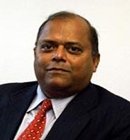|
Plenary
Lecture
Numerical Study of Applications of Active Flow Control

Professor Ramesh K. Agarwal
Department of Mechanical Engineering and Materials Science
Washington University in St. Louis
St. Louis, MO 63130, USA
E-mail: rka@wustl.edu
Abstract:
In recent years, a promising approach to the control of
wall bounded as well as free shear flows, using
synthetic jet (oscillatory jet with zero-net-mass-flux)
and pulsed jet actuators, has received a great deal of
attention. A variety of impressive flow control results
have been achieved experimentally by many researchers
including the vectoring of conventional propulsive jets,
modification of aerodynamic characteristics of bluff
bodies, control of lift and drag of airfoils, thrust
augmentation in ejectors, reduction of skin-friction in
a boundary layer flow, enhanced mixing in circular jets,
control of external as well as internal flow separation
and of cavity oscillations. More recently, attempts have
been made to numerically simulate many of these flow
fields primarily by employing the Unsteady
Reynolds-Averaged Navier Stokes (URANS) equations with a
turbulence model and in a limited few cases by Large
Eddy Simulation LES) and Direct Numerical Simulation
(DNS). In this paper, the results of simulations for six
different flow fields dealing with thrust-vectoring of a
propulsive jet, control of separation on a backward
facing step, control of cavity oscillations, thrust
augmentation of an ejector, transonic drag reduction of
an airfoil, and drag reduction of a truck shaped body
using active flow control are described. These
simulations have been performed using the URANS
equations in conjunction with either one- or a
two-equation turbulence model. The simulations
demonstrate the effectiveness of active flow control
techniques in flow modification to achieve the desired
outcome of drag reduction and separation control in many
industrial applications.
Brief Biography of the Speaker:
Professor Ramesh Agarwal is the William Palm Professor
of Engineering and the director of Aerospace Engineering
Program and Aerospace Research and Education Center at
Washington University in St. Louis. From 1994 to 2001,
he was the Sam Bloomfield Distinguished Professor and
Executive Director of the National Institute for
Aviation Research at Wichita State University in Kansas.
From 1978 to 1994, he worked in various scientific and
managerial positions at McDonnell Douglas Research
Laboratories in St. Louis. He became the Program
Director and McDonnell Douglas Fellow in 1990. Dr.
Agarwal received Ph.D in Aeronautical Sciences from
Stanford University in 1975, M.S. in Aeronautical
Engineering from the University of Minnesota in 1969 and
B.S. in Mechanical Engineering from Indian Institute of
Technology, Kharagpur, India in 1968. Over a period of
35 years, Professor Agarwal has worked in Computational
Fluid Dynamics (CFD), nanotechnology and renewable
energy systems. He is the author and coauthor of over
300 publications and serves on the editorial board of
fifteen journals. He has given many plenary, keynote and
invited lectures at various national and international
conferences worldwide. Professor Agarwal continues to
serve on many professional, government, and industrial
advisory committees. Dr. Agarwal is a Fellow of fifteen
societies - American Association for Advancement of
Science (AAAS), American Institute of Aeronautics and
Astronautics (AIAA), American Physical Society (APS),
American Society of Mechanical Engineers (ASME), Royal
Aeronautical Society (RAeS), Society of Manufacturing
Engineers (SME), Society of Automotive Engineers (SAE),
Institute of Electrical and Electronics Engineers
(IEEE), American Society of Engineering Education (ASEE),
American Academy of Mechanics (AAM), Institute of
Physics, Energy Institute, Institute of Engineering and
Technology, Academy of Science of St. Louis, and World
Innovation Foundation (WIF). He has served as a
distinguished lecturer of AIAA (1996-1999), ASME
(1994-1997), IEEE (1994-2011), and ACM (2011). He has
received many honors and awards for his research
contributions including the ASME Fluids Engineering
Award (2001), ASME Charles Russ Richards Memorial Award
(2006), Royal Aeronautical Society Gold Award (2007),
AIAA Aerodynamics Award (2008), AIAA/SAE William
Littlewood Lecture Award (2009), James B. Eads Award of
the Academy of Science of St. Louis (2009), SAE Clarence
Kelly Johnson Award (2010), SAE Franklin W. Kolk
Progress in Air Transportation Award (2010), ASME Edwin
Church Medal (2011), and AIAA Thermophysics Award
(2011).
|
